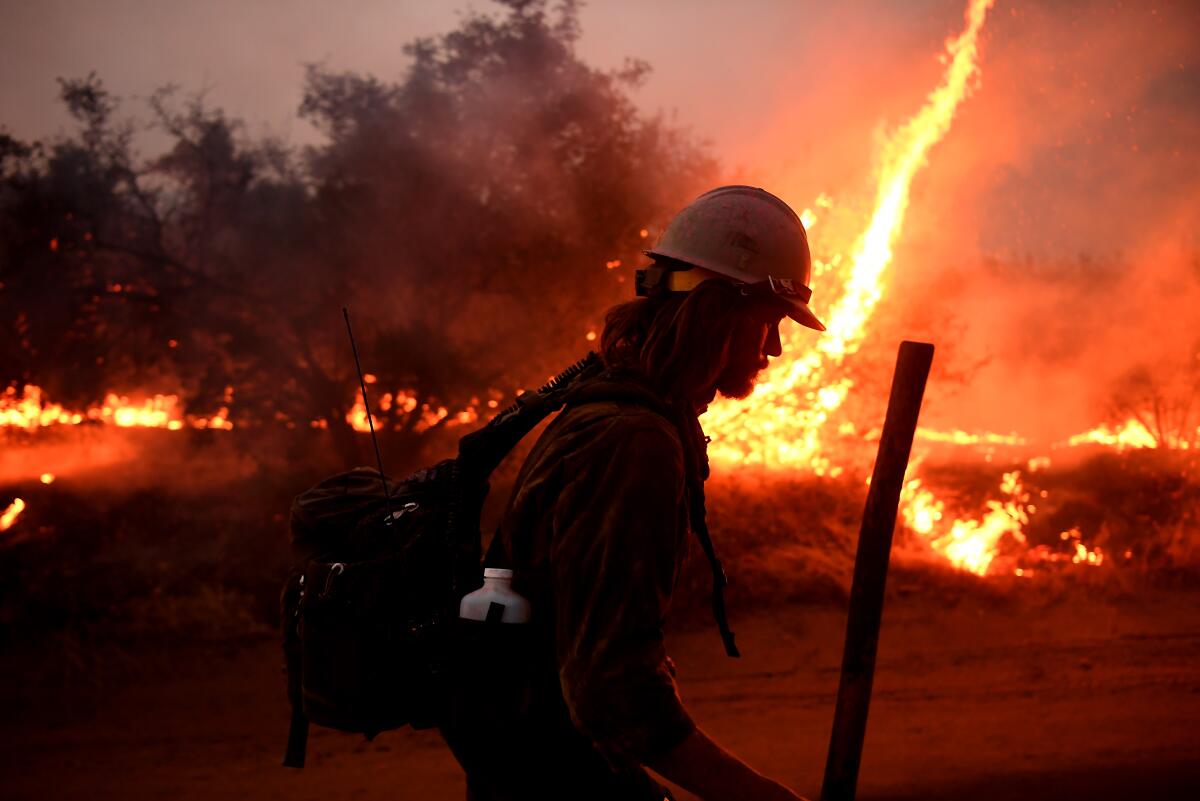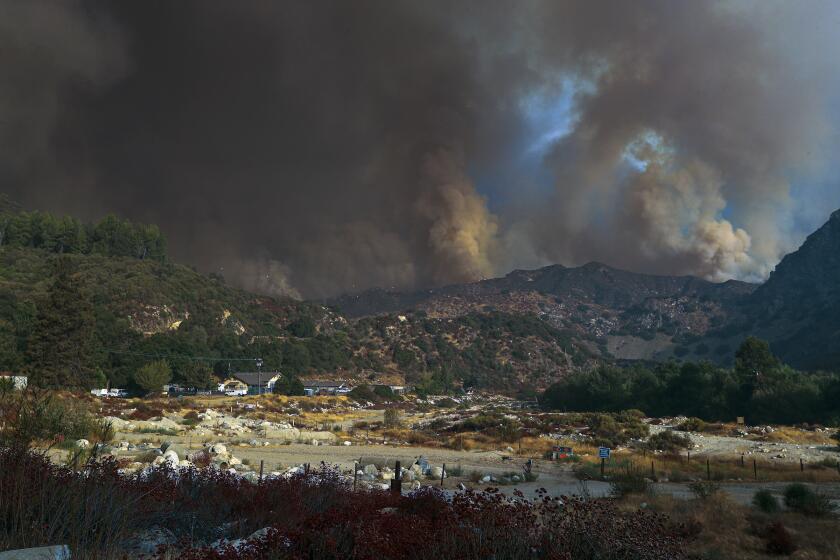Op-Ed: Don’t believe self-serving messengers. Logging will not prevent destructive wildfires

- Share via
My community of Big Bear City, in the mountains east of Los Angeles, had a tense week recently. For a few nerve-racking days, the El Dorado fire, which has burned more than 20,000 acres in and around the San Bernardino National Forest, threatened to move our way.
The fire had seen little movement in the previous days, despite the fact that it was burning in dense forests with many dead trees and downed logs. Weather conditions had been cool and calm. Then things changed, and quickly. The weather shifted to hot, dry and windy. Right away, the El Dorado fire began spreading much more rapidly, toward Big Bear. We were notified to prepare for potential evacuation. Several days later, temperatures cooled again, winds died down and fire activity calmed.
Scenarios like this are playing out across the western United States, especially in California and Oregon. Many homes have been lost and, tragically, at least 30 lives too. Numerous communities have been forced to evacuate, displacing thousands of families. People are scared and looking for answers.
Meanwhile, as wildfires continue in parts of the West that don’t often burn, a troubling new form of climate change denial has crept into the public dialogue, and it is only increasing the threats to public safety.
The logging industry — and the Republican and Democratic politicians whose reelection campaigns it finances — are busy telling the press and the public that they should focus on “forest management” in remote wildlands, rather than on climate change and community wildfire preparedness. Joining this chorus is a group of agency and university scientists funded by the Trump administration.
Logging bills are now being promoted in Congress, ostensibly as solutions. Sens. Dianne Feinstein (D-Calif.) and Steve Daines (R-Mont.) introduced a bill last month that would severely erode environmental laws to increase commercial logging in our national forests. Sen. Ron Wyden (D-Ore.) has introduced a bill that would triple funding to subsidize logging on federal forestlands.
We’ll never get ahead of these crises until we make the investments needed to reverse the course of climate change.
My colleagues and I conducted an ambitious scientific study on wildfire behavior and trends — one of the largest ever to analyze the factors that drive such fires. The study involved three decades of data and tens of millions of acres of forest fires across the American West.
What we found will not surprise most people who have an understanding of climate change. Weather and climate influence fire behavior much more than other factors. Alarmingly, in forests where trees had been removed by logging, fires burned hotter and faster. That’s because removing trees reduces shade; creates hotter, drier and windier conditions; and causes highly combustible invasive grasses to spread.
Numerous other scientists — those who are not funded by logging corporations or the Trump administration — have found the same thing. Weather and climate factors are what mainly drive wildfire behavior. Fires do not tend to burn more intensely in dense forests, or in forests with high numbers of dead trees.
Our large wildfires are driven in significant part by the climate crisis. We should respond by protecting vulnerable communities, not by allowing more logging in backcountry public forests, which does not stop fires and often makes them burn faster toward towns, as we saw tragically with the Camp fire in Northern California.
This year’s wildfire season has brought the biggest and fastest runs we have seen. The Creek fire and the Bear fire, in the Sierra Nevada, traveled most rapidly through areas where extensive commercial logging had already occurred, often under the deceptive guise of “fuel reduction.”
More than 200 of the top climate, forest and fire scientists in the country recently warned Congress that logging not only increases wildfire intensity and spread, but also emits more carbon into our atmosphere annually than our economy’s residential and commercial sectors combined. The scientists, myself included, urged policymakers to increase protection of forests from logging.
The only effective way to protect homes and lives from wildfires is to direct more resources toward creating fire-safe communities, improving warning systems and providing adequate evacuation assistance. Passing the Wildfire Defense Act, introduced last year by Sen.Kamala Harris (D-Calif.), would be a step in the right direction.
The climate crisis is going to loom larger every year, threatening more lives and communities. This is no time to be misled by the self-serving claims of timber companies or the politicians and scientists whose funding is tied to them. Our priority should be public safety, not profits for the logging industry.
Chad Hanson is a research ecologist with the John Muir Project. He is a co-editor and co-author of “The Ecological Importance of Mixed-Severity Fires: Nature’s Phoenix” and the author of “Smokescreen.”
More to Read
A cure for the common opinion
Get thought-provoking perspectives with our weekly newsletter.
You may occasionally receive promotional content from the Los Angeles Times.











